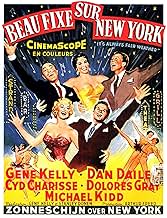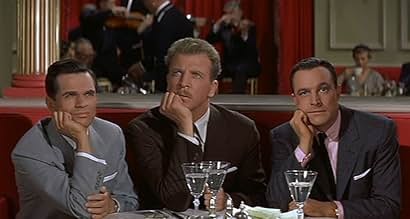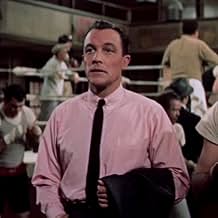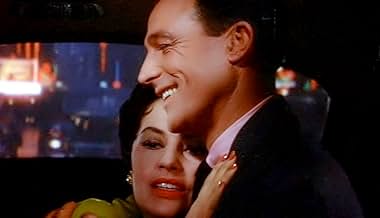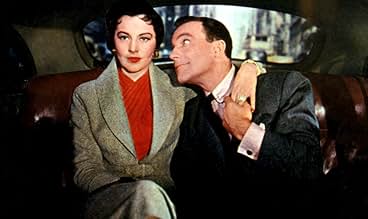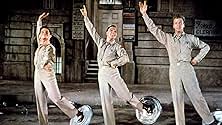IMDb-BEWERTUNG
7,0/10
4223
IHRE BEWERTUNG
Füge eine Handlung in deiner Sprache hinzuThree soldiers meet ten years after their last meeting in New York, and find out that they have little in common now.Three soldiers meet ten years after their last meeting in New York, and find out that they have little in common now.Three soldiers meet ten years after their last meeting in New York, and find out that they have little in common now.
- Für 2 Oscars nominiert
- 3 Nominierungen insgesamt
David Ahdar
- Dancing Boxer
- (Nicht genannt)
Betty Arlen
- Girl
- (Nicht genannt)
Phil Arnold
- Butch - Assistant at Stillman's Gym
- (Nicht genannt)
Sybil Bacon
- Woman on Skates
- (Nicht genannt)
Walter Bacon
- Bartender
- (Nicht genannt)
Jimmy Baird
- Child Dancer
- (Nicht genannt)
Tom Bernard
- Page
- (Nicht genannt)
Rodney Bieber
- Dancing Boxer
- (Nicht genannt)
Madge Blake
- Mrs. Stamper
- (Nicht genannt)
Willie Bloom
- Bar Patron
- (Nicht genannt)
Empfohlene Bewertungen
Just an aside,really:
You notice how sparsely Gene Kelly's finest numbers are shot? Long takes,little in the way of cinematic flair? Well,ponder this for a moment-he will often do something truly spectacular at the end of a take,leading one to wonder just how many times the poor chap put himself through the preceding minutes before getting it right...
A case in point is the justly famed (among those in the know) "Rollerskate Number":In order to demonstrate that the skates are,indeed,authentic,Kelly will swap-flawlessly-from "tap" to "glide" at the end of each take.
Incredible.
Compare and contrast,by the way,with protege Donald O'Connor's emulation in "I Love Melvin"-we never see thetwo movements co-existing within the same shot.
Gene Kelly made me want to dance when I was 11,and not feel like a poof for doing so.
You notice how sparsely Gene Kelly's finest numbers are shot? Long takes,little in the way of cinematic flair? Well,ponder this for a moment-he will often do something truly spectacular at the end of a take,leading one to wonder just how many times the poor chap put himself through the preceding minutes before getting it right...
A case in point is the justly famed (among those in the know) "Rollerskate Number":In order to demonstrate that the skates are,indeed,authentic,Kelly will swap-flawlessly-from "tap" to "glide" at the end of each take.
Incredible.
Compare and contrast,by the way,with protege Donald O'Connor's emulation in "I Love Melvin"-we never see thetwo movements co-existing within the same shot.
Gene Kelly made me want to dance when I was 11,and not feel like a poof for doing so.
Keep in mind that the era of the movie musical was pretty much in the dust when IT'S ALWAYS FAIR WEATHER hit the screens in 1955. Yet the story is an odd hybrid for benign musicals, and a rather dark story of three GI's coming home from the war, vowing a loyal, buddy-buddy reunion, then, upon reuniting years later, realizing they have outgrown one another and have virtually nothing in common. There is a reunion dinner at a posh nightclub, and try as they might, hostility and acrimony flare up among the men as they gradually discern they have now little in common. The movie also teams Dan Daily and Michael Kyd with Kelly, a Grade A, winning combination for the few, but excellent numbers, they perform.
However, this movie should be seen for one and one reason only: Gene Kelly's dance on roller skates to one of the most beautiful tunes ever written by Comden and Green. As the story goes, Kelly had been searching for just the right opportunity to dance on skates in a film for years. Betty Comden has said she lived close to Kelly in Beverly Hills and that he had purchased skates years before at a hardware store near-by and that she'd watched Kelly take his daughter skating many times. It's not a stretch that Kelly spent a lot of hours imagining just where and when he'd do a roller skates number as he flew around Beverly Hills on wheels.
Another delight is the very robust and creative "trash can lids" number featuring Kelly, Dan Daily, and Michael Kyd. With a trash can lid stuck to one foot, the trio bounce up and down a street to a snappy melody while still in uniform. For those who thought lanky Dan Daily was "just another hoofer," this number proves he could hold his own with the best of them.
I have heard Comden and Green also relate the story that after the movie opened someone told them they had seen the film in a drive-in. "I knew that the end had come," (for the movie musical) commented Adolf Green.
IT'S ALWAYS FAIR WEATHER is very much worth seeing for being one of the last studio movie musicals of its kind. Moreover, the novelty of watching Kelly teamed with Dan Daily and Michael Kyd--the only time those three dancers appeared together--is supremely enoyable. IT'S ALWAYS FAIR WEATHER remains underrated to this day and serves as one of the final signposts for the demise of the great screen musical.
Dennis Caracciolo
However, this movie should be seen for one and one reason only: Gene Kelly's dance on roller skates to one of the most beautiful tunes ever written by Comden and Green. As the story goes, Kelly had been searching for just the right opportunity to dance on skates in a film for years. Betty Comden has said she lived close to Kelly in Beverly Hills and that he had purchased skates years before at a hardware store near-by and that she'd watched Kelly take his daughter skating many times. It's not a stretch that Kelly spent a lot of hours imagining just where and when he'd do a roller skates number as he flew around Beverly Hills on wheels.
Another delight is the very robust and creative "trash can lids" number featuring Kelly, Dan Daily, and Michael Kyd. With a trash can lid stuck to one foot, the trio bounce up and down a street to a snappy melody while still in uniform. For those who thought lanky Dan Daily was "just another hoofer," this number proves he could hold his own with the best of them.
I have heard Comden and Green also relate the story that after the movie opened someone told them they had seen the film in a drive-in. "I knew that the end had come," (for the movie musical) commented Adolf Green.
IT'S ALWAYS FAIR WEATHER is very much worth seeing for being one of the last studio movie musicals of its kind. Moreover, the novelty of watching Kelly teamed with Dan Daily and Michael Kyd--the only time those three dancers appeared together--is supremely enoyable. IT'S ALWAYS FAIR WEATHER remains underrated to this day and serves as one of the final signposts for the demise of the great screen musical.
Dennis Caracciolo
It's Always Fair Weather has a somewhat ironic title, because it's not like most every other M-G-M musical in that things don't always turn out perfectly. I believe that its darker-than-average humour (for that time at least) contributed to its being ahead of its time. For instance, the plot has to do with a friendship not being the same after ten years, a boxing match being fixed, a jaded woman (Charisse), a corporation sell-out (Dailey), and a "small-time operator" (Kelly). The numbers, though, are typically excellent, particularly the dance in the beginning where the trio is drunk, Cyd's Baby You Knock Me Out, and Kelly's famous I Like Myself, in which he tap dances on rollerskates! Gene Kelly and Stanley Donen's choreography is nothing short of dazzling. And yes, Gene's smile could still melt stone. Cyd Charisse is great and beautiful as always, too bad she had only one number. So go see It's Always Fair Weather, just don't expect anything real fluffy.
For a guy like me who can't dance his way out of a closet, musicals like this are a guilty pleasure. The choreography is great-- flying feet, trash can lids, roller skates—is there any step Kelly can't do. I especially like the boxing gym with its unlikely array of chorus boys. But it's got nothing on Kelly's solo glide over city streets. Nonetheless, Dailey and Charisse appear under-used; this really is a Kelly showcase, which is plenty. Musicals, of course, were right up MGM's alley. Their lavish production budgets could fill up a screen. Here it's a mesmerizing sample of candy-box colors, along with a Cinemascope canvas to color on.
But catch the storyline. It's a little on the dark side for a bon-bon like this. Our three musketeers return from WWII great buddies, swearing to meet again after ten years. But the decade passes and they've changed. Now they can hardly stand each other. Trouble is, as civilians, each has compromised himself. That is, Kelly fixes boxing matches, Dailey cheats inside his swanky position, while Kidd gets pretentious with his hotdog stand. What they have to do is rediscover the ex-GI's they really are. Good thing a leggy Charisse is there to help kick in. Especially for oglers like me. And what a send-up of the old TV hit This Is Your Life. An obnoxious Madeline (Gray) of "Midnight With Madeline" may make you turn off your sets at 9pm, and none too soon.
Anyway, the 100-minutes is a delightful way to pass a slow evening, and even made me want to give the closet another try.
But catch the storyline. It's a little on the dark side for a bon-bon like this. Our three musketeers return from WWII great buddies, swearing to meet again after ten years. But the decade passes and they've changed. Now they can hardly stand each other. Trouble is, as civilians, each has compromised himself. That is, Kelly fixes boxing matches, Dailey cheats inside his swanky position, while Kidd gets pretentious with his hotdog stand. What they have to do is rediscover the ex-GI's they really are. Good thing a leggy Charisse is there to help kick in. Especially for oglers like me. And what a send-up of the old TV hit This Is Your Life. An obnoxious Madeline (Gray) of "Midnight With Madeline" may make you turn off your sets at 9pm, and none too soon.
Anyway, the 100-minutes is a delightful way to pass a slow evening, and even made me want to give the closet another try.
It's Always Fair Weather will go down in history as the film musical which "could have been". Had it been made a few years earlier it could have been in the same leagues as Singin' In the Rain and On the Town but several shortcomings, some determined by the period the film was made prevent it from being so. Even the studio had that little faith in it they dumped it as a second feature alongside Bad Day At Black Rock.
It's Always Fair Weather differs from other musicals of its time in its sombre tone with the tale of three war buddies who are reunited ten years later to find out they can't stand each other upon discovering one is a hick, a snob and a goon. This is juxtaposed to a world of beautiful, bright colours and welcome artificiality with urban sets to die for. It's Always Fair Weather was originally conceived as a sequel to On the Town, reuniting Gene Kelly with co-stars Frank Sinatra and Jules Munshin. However, by 1955, Munshin no longer had box office credibility while Sinatra was too big a star that the studio was unwilling to work with him. In their place, we get Dan Dailey and Michael Kidd, both of whom get the job done but lack the same electric chemistry Kelly's On the Town co-stars possessed. Frank Sinatra in particular I find is sorely missed as I loved his three-picture partnership with Kelly in which they made an excellent comedic duo. None the less the roaster does get a big boost with the casting of the great Cyd Charisse, whom like Ann Miller in On the Town, plays a glamorous woman with contradictory personality and an encyclopedic knowledge of well, pretty much any topic.
However, I find It's Always Fair Weather's biggest drawback are the sections of the film which are uneventful and doesn't have the lightning-fast pace of On The Town or Singin' In The Rain. The film could definitely benefit from the trimming or removal of whole scenes; there is a faster-paced, snappier film in here. The film does help make up for this though in its musical numbers. It's Always Fair Weather does showcase some of the best moments of any MGM musical with the soundtrack being one of the best in the MGM catalogue. The musical numbers and compositions are fantastic and all written for the film itself by the great Betty Comden and Adolph Green, while the majority of MGM musicals took their songs from their back catalogue as well as other stage musicals.
The five-minute Gershwin like dance number "The Binge" showcases the then-new cinemascope format by having three dancers occupy their own third of the screen as they dance and create percussion with trash can lids on their feet as they work together in great physical tandem of drunken joy. Once Upon a Time, on the other hand, is a heart aching number if there was one as the three men sing about their broken dreams while Music is Better Than Words couldn't be more enchanting if you asked for it. The centrepiece of the film, however, is Gene Kelly's number 'I Like Myself', featuring him tap dancing on roller skates, no trickery! Like Singin' In the Rain, the number is an encapsulation of pure happiness (just look at the faces of the onlooking extras). This is of my favourite musical numbers of all time and is an unbelievable display of talent if I ever saw it. The film's only crime in the song and dance department is the lack of a dance number between Gene Kelly and Cyd Charisse, despite one actually being filmed.
I feel widescreen technology came too late the MGM musicals which could have used it to great advantage but by 1955 musicals had already lost most of their economic viability due to the rise of television. It's Always Fair Weather is Hollywood coming to terms with the existence of its rival television but relishes the opportunity to satirize the format as superficial and ridden with advertising.
It's Always Fair Weather differs from other musicals of its time in its sombre tone with the tale of three war buddies who are reunited ten years later to find out they can't stand each other upon discovering one is a hick, a snob and a goon. This is juxtaposed to a world of beautiful, bright colours and welcome artificiality with urban sets to die for. It's Always Fair Weather was originally conceived as a sequel to On the Town, reuniting Gene Kelly with co-stars Frank Sinatra and Jules Munshin. However, by 1955, Munshin no longer had box office credibility while Sinatra was too big a star that the studio was unwilling to work with him. In their place, we get Dan Dailey and Michael Kidd, both of whom get the job done but lack the same electric chemistry Kelly's On the Town co-stars possessed. Frank Sinatra in particular I find is sorely missed as I loved his three-picture partnership with Kelly in which they made an excellent comedic duo. None the less the roaster does get a big boost with the casting of the great Cyd Charisse, whom like Ann Miller in On the Town, plays a glamorous woman with contradictory personality and an encyclopedic knowledge of well, pretty much any topic.
However, I find It's Always Fair Weather's biggest drawback are the sections of the film which are uneventful and doesn't have the lightning-fast pace of On The Town or Singin' In The Rain. The film could definitely benefit from the trimming or removal of whole scenes; there is a faster-paced, snappier film in here. The film does help make up for this though in its musical numbers. It's Always Fair Weather does showcase some of the best moments of any MGM musical with the soundtrack being one of the best in the MGM catalogue. The musical numbers and compositions are fantastic and all written for the film itself by the great Betty Comden and Adolph Green, while the majority of MGM musicals took their songs from their back catalogue as well as other stage musicals.
The five-minute Gershwin like dance number "The Binge" showcases the then-new cinemascope format by having three dancers occupy their own third of the screen as they dance and create percussion with trash can lids on their feet as they work together in great physical tandem of drunken joy. Once Upon a Time, on the other hand, is a heart aching number if there was one as the three men sing about their broken dreams while Music is Better Than Words couldn't be more enchanting if you asked for it. The centrepiece of the film, however, is Gene Kelly's number 'I Like Myself', featuring him tap dancing on roller skates, no trickery! Like Singin' In the Rain, the number is an encapsulation of pure happiness (just look at the faces of the onlooking extras). This is of my favourite musical numbers of all time and is an unbelievable display of talent if I ever saw it. The film's only crime in the song and dance department is the lack of a dance number between Gene Kelly and Cyd Charisse, despite one actually being filmed.
I feel widescreen technology came too late the MGM musicals which could have used it to great advantage but by 1955 musicals had already lost most of their economic viability due to the rise of television. It's Always Fair Weather is Hollywood coming to terms with the existence of its rival television but relishes the opportunity to satirize the format as superficial and ridden with advertising.
Wusstest du schon
- WissenswertesGene Kelly bought the roller skates for the "I Like Myself" number down the block from his house at Pioneer Hardware on Beverly Drive. He also mentioned that the skates were not altered in any way; they weren't locked to his shoes, so when he tapped in them, he had no help.
- PatzerIn the 1945-1955 montage, the shot of the 1953 New Years Eve crowds at Times Square shows Waffenschmuggler von Kenya (1941) at the Criterion Theatre, so it's obviously New Years Eve 1941-1942 footage.
- Zitate
Doug Hallerton: There must be some more dignified way to sell Klenzrite... like you, taking a bath in it, stark naked in Macy's window.
- VerbindungenEdited into American Masters: Gene Kelly: Anatomy of a Dancer (2002)
- SoundtracksMarch, March
(1955) (uncredited)
Music by André Previn
Lyrics by Betty Comden and Adolph Green
Performed by Gene Kelly, Michael Kidd (dubbed by Jud Conlon) and Dan Dailey
Top-Auswahl
Melde dich zum Bewerten an und greife auf die Watchlist für personalisierte Empfehlungen zu.
Everything New on HBO Max in August
Everything New on HBO Max in August
Looking for something different to add to your Watchlist? Take a peek at what movies and TV shows are coming to HBO Max this month.
- How long is It's Always Fair Weather?Powered by Alexa
Details
- Erscheinungsdatum
- Herkunftsland
- Sprachen
- Auch bekannt als
- It's Always Fair Weather
- Drehorte
- Produktionsfirma
- Weitere beteiligte Unternehmen bei IMDbPro anzeigen
Box Office
- Budget
- 2.771.000 $ (geschätzt)
- Weltweiter Bruttoertrag
- 1.309 $
- Laufzeit
- 1 Std. 41 Min.(101 min)
- Farbe
- Seitenverhältnis
- 2.55 : 1
Zu dieser Seite beitragen
Bearbeitung vorschlagen oder fehlenden Inhalt hinzufügen


